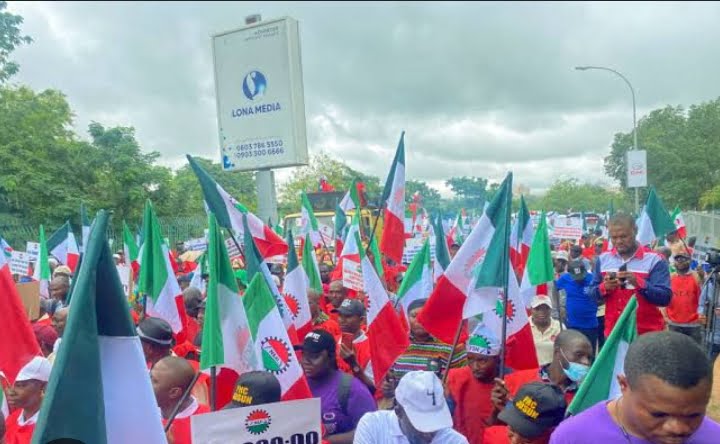Ibraheem Ladi Amosa
In the face of daily heartbreak, injustice, and oppression in places like Nigeria, Syria, Sudan, and Libya, the question of protests in Islam arises.
Protests, powerful tools for expressing grievances and demanding change, have been used since the mid-19th century. However, in Islam, the permissibility of protests is a complex matter of ijtihad, balancing local and global socio-political realities.
As protests are acts of worship, they require clear evidence to be deemed valid. This delicate issue is best left to knowledgeable scholars who can navigate its intricacies, guided by wisdom and understanding.
SIMILAR: Gov. Yusuf Recieves Protesters Conveys Grievances To Tinubu
*Scholars with Contemporary Knowledge Differ on the Ruling of Protests*
*Opinion A: Permissible with Conditions*
*• Conditions:*
O Limited to achieving some benefit or avoiding harm, and should not lead to greater perversion or something worse.
O Should not result in evil consequences like sabotage or transgression against public properties.
O Must be free of forbidden acts such as mixing between men and women, women going out adorned, use of music, shouting incorrect slogans, begging non-Muslims in humiliating ways, holding up pictures or effigies, blocking roads, and using slanderous words.
O Avoid imitating non-Muslims in their unique characteristics or committing acts of aggression against innocent people’s properties. https://www.academia.edu/122024090/The_Complex_Reality_of_Protests_in_Islam_Leesons_for_Nigeria?fbclid=IwZXh0bgNhZW0CMTEAAR0gIAsDieaVI-huOf12OH46HWyaxCkrga-VFkcE6zrSEvXlyuTOiWWRqhg_aem_hy0hVSGk51OIx40030nAqA
*• Evidences:*
O Some Sahabah, including Umar and Hamzah (may Allah be pleased with them), protested in Makkah. (Weak Hadith, Aboo Nu’aym Al-Asbahaanee in his Hilyat Al Awliyaa (volume 1, page 40, Shaykh Alee Ridhaa said, “This narration is not authentic, ..rather it is very weak.” Shaykh Albaanee said: 6531:Munkar (rejected), Aboo Nu’aym and Al-Bazzaar (3/169-171), Fadhaa’il as-Sahaba (1/285-288), Asad Al Ghaaba (3/644), Al Mujama’ 9/65, and at-Tabaraanee in Al Awsat)
O Strike and protest are means to achieve something, and means are part of norms; thus, permissible if not explicitly prohibited.
*Opinion B: Not Permissible*
*• Evidences:*
O No authentic hadith establishes the permissibility. (Hadiths quoting that Sahabah protested are weak).
O Strike or protest was not practiced by the Sahabah or Salaf and is considered a tradition of non-Muslims.
Most Reliable Ruling: Opinion B
*• Reasoning:*
1. Hadiths stating Umar Al-Faarooq, Hamzah and other Sahabah (may Allaah be pleased with them) protested are weak
2. Arguments against Protests: What is not Islamic by origin, its process, and its outcome cannot be Islamized.
Protests typically involve:
• Imitating non-Muslims and engaging in free mingling between sexes.
•
• Destruction of properties, whether belonging to innocent people or the government, leads to violence and disruption of business activities.
•
• Cooperating upon sin and misguidance, compromising the Sunnah, and resulting in greater harm than good.
•
• Wasting time and money, inconveniencing others, and blocking roads.
•
• Chanting inappropriate or haram slogans while displaying hostility toward non-participants.
•
• Indecent dressing, using slanderous words, cursing, backbiting, and exposing sins.
•
• Using musical instruments, singing, and dancing, alongside collecting undeserved salaries during strikes.
•
• Believing jihad should be quiet and private, with demonstrations not being part of it.
•
• Rebellion led to greater corruption, splitting the Jamaah, and undermining leadership, resulting in fear, hunger, shedding blood, and weakening religion.
•
• Rights should be pursued through Shariah-legislated means.
•
*Reliable Fatwas on Protests:* Various fatwa of scholars such as Shaykh Muhammad Amaan bin Alee Al-Jaamee, Shaykh Abdul-Muhsin Al-’Abbaad Aal-Badr, Shaykh Abdus-Salaam bin Burjiss Aal Abdul-Kareem, Shaykh al-Islam Ibn Taymiyya, Shaykh Saalih al-Fawzaan, Shaykh Ibn Baz, Shaykh Ibnul Uthaymeen, Shaykh Muhammad bin Abdul-Wahhaab Al-’Aqeel, Shaykh ‘Abdul-Qaadir bin Muhammad Al-Junaid, Shaykh Uthmaan As-Saalimee, Shaykh Muhammad bin Abdul-Wahhaab Al-’Aqeel, and Shaykh Muhammad Naasiruddeen Al-Albaanee have provided numerous references against protests and demonstrations, emphasizing the harm, chaos, and un-Islamic origins associated with such actions.
*Conclusion*
Scholars of the Sunnah do not support demonstrations and protests as they lead to harm, imitate non-Muslims, and contradict Islamic teachings. Peaceful means such as dialogue and writing are preferred to seek benefits. Muslims should adhere to the teachings of Islam and avoid actions that compromise their faith and societal order.
Protests, though powerful, can distract and pacify us from pursuing more impactful actions for true change. In Nigeria, as in any land, the strength of a nation is subverted not by external foes but by internal strife. Demoralization and civil unrest wield immense power; convince a people their country is evil, and they may feel morally obliged to dismantle it, seeing resistance as unkind. Once labeled evil, reconciliation becomes impossible.
Experience with Nigerian protests reveals how they can minimize risks for criminals while maximizing harm to the innocent. Viral videos of those advocating for protests reveal a disregard for religious teachings and history lessons. They attack role models and scholars, undermining voices of wisdom. When calls for peaceful protests spiral into chaos, who bears the brunt? Roadblocks disrupt lives, and chaos leads to loss. Let’s heed this wisdom. May Allah protect Nigeria from the fate of Libya, Sudan, and Syria.
Ibraheem Ladi Amosa
_markazihyaahisunnah@gmail.com_
